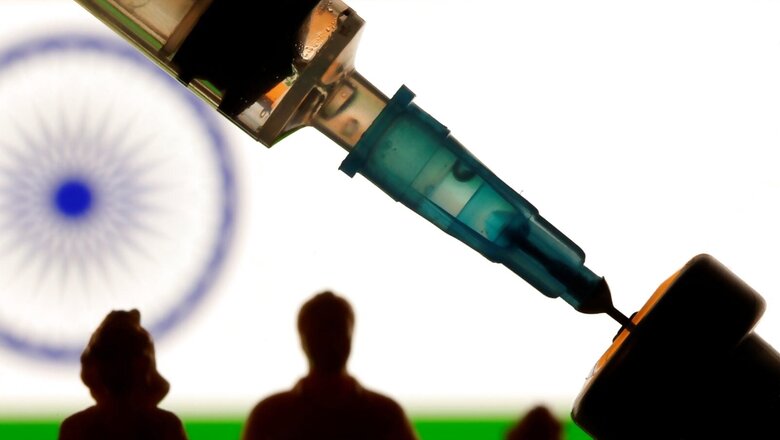
views
We live in times when the state is expected to be decisive, unyielding and uncompromising in national interest. What is then stopping us from issuing executive orders mandating COVID-19 vaccines for all adults? Even in the most liberal frameworks, coercion is justified when individual behaviour harms others. Having just about reached the halfway mark in vaccinating the entire population, we need to hurry if we are to complete the almost impossible task of fully vaccinating everyone by the month-end. While there were teething troubles on the supply side that impacted the pace of vaccination early this year, we cannot ignore the challenges on the demand side too.
It is more than high time for us to declare an emergency and mandate COVID-19 vaccines for all. By now, we have irrefutable evidence that vaccines work and that there is really no evidence of any collateral damage. It is also clear that unvaccinated people are vectors carrying the infection wherever they travel. Vaccinated people are also getting infected but constitute a far lower risk, both to themselves and to their neighbourhood. In most discussions on bioethics, it is now widely accepted that mandatory vaccinations are justified when they help eradicate disease, or when they fight against seriously infectious and contagious antigens.
Vaccines and Global Trends
Vaccination works. Vaccines have fought two of the most dreaded diseases in the twentieth century. Both smallpox, which has been completely eradicated, and polio, where we are almost there, have been worn out with vaccines that were given to entire populations. Polio vaccines were administered to all children after a series of communication campaigns were launched, influencers were convinced, celebrity ambassadors were roped in and the clergy/religious leaders were involved in massive community engagements. India has been polio-free for nearly ten years now.
ALSO READ | Which Covid Vaccines Need Boosters, Who Will Get Them First? India’s Top Public Health Expert Decodes
As for COVID-19, Austria has announced that it will make vaccination compulsory from February 2022. Germany may follow suit. Indonesia has hinted it would make social schemes conditional based on vaccination status. Government employees in Canada and teachers in New Zealand have no option but to be fully vaccinated. Similar conditions have been put in place in some US states and the UK for government workers, especially healthcare staff.
Given the threat of new variants and with no end in sight for the pandemic, more and more countries are likely to take this route. In India, the central government has submitted in court that COVID vaccine is neither mandatory nor has it been linked to social services or benefits.
Challenges for India
India’s situation is rather precarious. We are not yet in the top half of countries that have vaccinated a large part of their population. Our 50 per cent coverage of eligible adult population is only slightly higher than the global average of 42 per cent. To date, more than 4.7 lakh people have died in India due to COVID-19, according to official estimates. Most fatalities were reported during the second wave when vaccine manufacturing and inoculation had started but there was a supply gap. Deaths reported during the period mostly comprised unvaccinated and a small percentage of those who had taken the first shot.
Even as supply bottlenecks have been resolved to a large extent, some challenges persist. Take for instance, the curious service charge price cap of Rs 150 for the private sector, taking away any incentive the market may have to join the vaccination drive. In any case, giving the private sector the task of vaccinating 25 per cent of the population is rather extravagant. There is no reason people will pay for vaccines in private sector hospitals when on one hand the vaccine is available free of cost in public hospitals and on the other there is no mandate for getting inoculated. Vaccines must be administered free of cost; the private sector has to be incentivised to provide their services where the state is unable to.
The biggest challenge, however, is the resistance to and hesitancy against vaccines. This is not entirely unjustified, and people may have serious objection to getting foreign fluids injected into their system. The alternate solution to coercion is payment for the risk taken. This suggestion was discussed at length in the US and some companies even offered such incentives to their employees.
ALSO READ | Is Omicron More Dangerous than Delta, Will Vaccines Work? India’s Leading Expert on Covid-19 Answers
However, any such measure will only increase the costs of healthcare and will also cast aspersions on the efficacy of the vaccine. Why the state is paying us to take vaccines if they are safe, people will ask. The fact is that despite all efforts, there will be some who will not get vaccinated, but so long as this number is less than 10 per cent of the population, there is no reason to worry.
The clear message that needs to be sent out is: people have no choice but to get vaccinated. Similar mandates have been issued on using seat belts and wearing helmets, with those flouting the rules being penalised. There can be some exemptions for vaccine, like people who cannot get vaccinated on account of some allergy or disease.
Criticism will come from various quarters but so long as the government is seen as doing everything possible to fight the pandemic and asking the public to cooperate by taking the vaccine, this move will help protect India and Indians from the vagaries and uncertainties of new COVID variants.
Amir Ullah Khan is Research Director, Centre for Development Policy and Practice. The views expressed in this article are those of the author and do not represent the stand of this publication.
Read all the Latest Opinions here


















Comments
0 comment